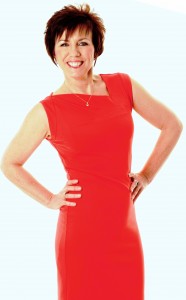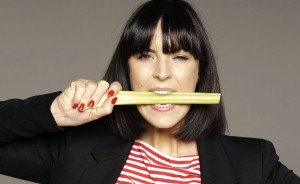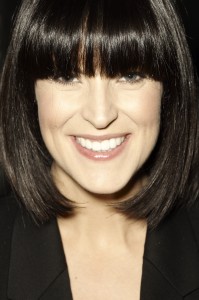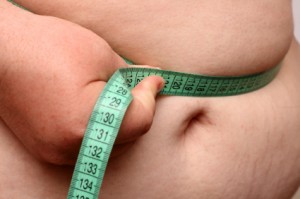 Read our exclusive interview with Anna Richardson a (Journalist, TV Presenter) and Janet Thomson (a positive attitude expert and author of Think More Eat Less) who tell us a bit about recent research into dieting.
Read our exclusive interview with Anna Richardson a (Journalist, TV Presenter) and Janet Thomson (a positive attitude expert and author of Think More Eat Less) who tell us a bit about recent research into dieting.
As millions of women embark on a New Year Diet, new research shows they could be setting themselves up for failure by describing themselves as fat, heavy and chubby
Women should cut out the negative “fat talk” if they want to successfully lose weight in 2013, a new report has revealed.
With millions of women now a week into their annual New Year diets, most will be focusing on their food and calorie intake and new exercise regimes, but how many of us will take into consideration the impact negative thinking and ‘fat talk’ has on our success or lack of?
Health and nutrition experts are now of the opinion that it’s not just ‘you are what you eat’ but ‘you are what you think’, when it comes to successful weight loss. That means if you constantly describe yourself as fat, heavy and overweight, have a negative self image and are not convinced your dieting will make any difference, then you are wiring your brain to keep you stuck in a weight-rut.
According to the study released today, eight in ten women believed a positive attitude is the key to losing weight even though over half of women said when starting a diet they are more likely to be self critical and use words such as “fat”.
The research revealed over two thirds of women use the word “fat” to describe an area of their body although six in ten say it makes them feel more negative about themselves than more positive words such as “curvy”. Furthermore, only a third of women actually start a diet believing they will lose weight and three quarters have daily negative thoughts about their body. However, over two thirds of women said when they have successfully lost weight in the past they have had a positive attitude and “talked themselves up”.
Four in ten said they talked more negatively about their body when they were with friends with a quarter admitting these open ”flaw exposing” conversations bring them down. However four in ten women said they felt more motivated if a friend had lost weight or had a more positive attitude to their body. Almost half of women surveyed by Special K said words such as beautiful, gorgeous and sexy made them feel most positive about themselves and a quarter said being described as a “real woman” made them feel good.
So if you’re determined to get into shape this year, have you considered how your attitude could be the key factor? And if you’re constantly focusing on what you need to lose and not what you will gain, are you keeping yourself stuck in the never-ending diet trap for years to come?
Teekshana Smith interviewed Richardson and Thomson on behalf of PatientTalk.
Teekshana Smith: Welcome to Patient Talk. As millions of women embark on their New Year diets, new research shows that they could be setting themselves up for failure, by describing themselves as fat, heavy and chubby. Joining me today is Anna Richardson, journalist and TV presenter and Janet Thompson who is a positive attitude expert and author of ‘Think More, Eat Less.’ Welcome! To start first, can you tell us a little bit more about the study and how it was conducted?
Anna Richardson: Well this is a really fascinating study that’s come out through Special K and they did a national survey of women. Just looking at how a positive attitude can positively affect their weight loss and this is really what we are talking about today is actually the fact that the secret to losing weight all starts in the mind. Now here’s a couple of very interesting statistics, according to the survey over 70% of women they spoke to use the word fat to describe their body which is immediately a very negative connotation with actually who you are and what you are about and then just 34% of women who start a diet think they are going to successfully lose that weight. Now, this is the point, if you start off thinking you are going to fail, you will fail and this is, in a sense, what Janet and I are trying to talk about today is the fact that if you want to make a change in your life, whatever that change may be but particularly with weight loss you have to truly believe that you are going to be able to do it in order to effect that change.
 Teekshana Smith: In particular a lot of the audience from Patient Talk felt that losing weight is one thing separately to completely keeping it off. Is that something you found?
Teekshana Smith: In particular a lot of the audience from Patient Talk felt that losing weight is one thing separately to completely keeping it off. Is that something you found?
Janet Thompson: Yes it is and the problem with that is that it is seen a bit like a course of antibiotics that you go on and you feel better so you come off because you’re cured and that’s how some people view the whole concept of a diet. In reality the word diet just means what you eat so all of us that eat are on a diet and when we’ve had experiences of restricted diets we make negative associations. So if you’ve been on a restrictive diet and you’ve not been allowed this and you’ve not had your favourite foods and you’ve not eaten enough because you’ve been hungry and you’ve constantly craved things and you’ve had to eat differently to the people around you, that’s a lot of negative association. So when you then try and do another diet your brain automatically says, hang on a minute, we’ve done this before, it was really unpleasant, we didn’t like it and look what happened, in the end we regained the weight anyway. So it will try and self-sabotage. So you get this cycle of dieting, losing weight, big sigh of relief, back to normal, etc. You know, I did a television programme last year about weight loss and at the end of filming one of the girls who had been working with the personal trainer at the end of filming and she’d lost lots of weight. Literality ran over to the food bar and stuffed her face with cakes because filming had stopped and that was the mind-set, I can do it for this long but I can’t sustain this as a long term lifetime choice. So we have to stop thinking about it as a course of antibiotics, it’s not something you do short term that clears the infection and then it makes you better and stays away. It’s about making changes that are sustainable and that might well mean a slower rate of weight loss but you have to get over that, that’s a good thing because if you are doing something that is not negative, that doesn’t make you feel bad, that is bringing positive results then you are going to be able to sustain it without any effort at all. No need for willpower, overcoming anything, you know making big heroic changes you are just doing stuff that isn’t difficult to do.
Teekshana Smith: I know that the survey was about women but do you think this negative talk is also potentially affecting men or is it just women because we discuss it more openly?
Anna Richardson: Oh of course it affects men as well. Essentially what we are talking about here is the brain. So anybody that actually thinks and has a mind. It’s going to apply to them so that is the entire population. So yes, man, woman you know, beast or fowl it is going to apply to them. If you think that you are going to fail at something, then you will.
Teekshana Smith: Would you say that’s the same for exercise?
Anna Richardson: When you say, is that the same for exercise in terms of sticking to it and you know, going into a gym all guns blazing and giving up a week later?
Teekshana Smith: Yes, exactly.
Anna Richardson: Well I think, well I’m quite passionate about this because I see it all the time on Secret Eaters and the other diet shows that I’ve worked on. People tend to try and substitute healthy eating with exercise and then they get really, really frustrated because they go to the gym five times a week, hammer away at it and then they can’t understand why they’re not losing any weight. In fact I had somebody recently on Secret Eaters, really fit girl she was a marathon runner this girl but she was overweight and she couldn’t understand why. And we secretly filmed her going for a run, she went for a 10k run, she came back into the house and she said I’ve just been running for two hours and I’ve burned up 1260 calories on that run and we then showed her the evidence of what she ate immediately after that 10k run and it turned out that she ate 1600 calories after it, so it completely negated everything that she’d just done by going out for two hours, slogging away, she even admitted she didn’t particularly enjoy doing this, she saw it as a kind of punishment, a kind of way of controlling her body. So really people substitute healthy eating for exercise and the two should kind of go hand in hand. You cannot lose weight going to the gym if you’re not addressing your diet in the first place so really it should be symbiotic.
Teekshana Smith: How would you describe the best way of controlling your diet or what healthy eating plan would you recommend?
Anna Richardson: Well really what I recommend, what worked for me and literally having tried every diet going professionally nothing worked for me until I went for one session of hypnosis and that changed my mind set. So in a sense it’s not even about recommending what diet to go on because all diets if you like succeed in that they are all about calorie deficit. Where you have to start is with yourself and with your own mind set and if you have the correct mind set then you will succeed at whatever eating plan you choose to go on. Don’t you think that’s right Janet?
Janet Thompson: Absolutely yeah and we have nutritional requirements, we need carbohydrates for energy, we need protein for growth and repair and we need fat for energy and for cell structure so we need all of these things. And any of these extreme diets that prohibit or drastically restrict any one of those are potentially harmful. And the problem is that people are looking for the next quick fix, the next miracle cure. We already know what we should be eating, we’re just eating too much of it.
Teekshana Smith: And on that note, what would you say to maybe missing out a meal or some of those new crazes about fasting for a few days. Is that not really a good idea?
Anna Richardson: Janet and I were talking about this earlier on because it is such a craze at the moment and I don’t know whether we differ a little bit on this. I mean the way that I would look at this is that any diet, as long as it’s a healthy diet, any diet that creates a calorie deficit is going to work. And intermittent fasting is simply about overall reducing your calories, it’s just a kind of new, unique way at looking at it and doing that. What do you think about it Janet?
Janet Thompson: Well I think we have to take for example the case of smoking. If you just said to somebody don’t smoke on a Monday, a Wednesday and a Friday and you’ll be a non-smoker then that wouldn’t make them a non-smoker and so what we have to do, if you want to stop smoking, you’ve got to get your head around the fact that you don’t smoke any more. You are a non-smoker; your identity is I am a non-smoker. So when you’re looking at food if your identity becomes I am a healthy eater, even healthy eaters have chocolate sometimes; even a healthy eater will have a crème Brule for pudding. They just don’t do it every day. So for me it’s more about getting in a mind-set that you can sustain every day without effort and I know certainly I wouldn’t want to fast for two days a week because I love my food. I absolutely love it, but I am in control of it enough to know, I’ve just had within a ten day period Christmas, New Year, my birthday and my partner’s birthday so I’ve done my share of over eating and I get it that now for a while I’ve got to eat a little bit less and probably move a little bit more to not have that muffin top that I really don’t want. It’s about doing things that I can sustain every day so that that becomes my default setting.
Teekshana Smith: I think that’s completely correct. So the basic message of this is to completely get in the right mind set to then be able to achieve the goals
Janet Thompson: Yeah the principle is, if you want to change your body, you have to change your mind.
Teekshana Smith: Where can our audiences go to find out a bit more information about the survey and everything we’ve discussed today?
Anna Richardson: There’s a fantastic website which is a great resource: www.myspecialk.co.uk which is free and it is just full of tons of information to set you on the right path in terms of positive thinking and how to make those positive changes for positive weight loss.
Teekshana Smith: Well thank you both of you very much for your time today. Thank you for listening to PatientTalk.
http://www.myspecialk.co.uk
You can listen to an interview of Smith interviewing Anna Richardson and Janet Thompson here Podcast: http://wtrns.fr/9g5o4Utr5yhCqwJ






